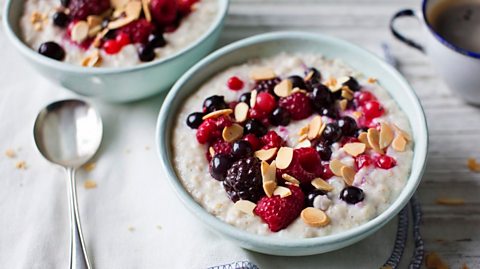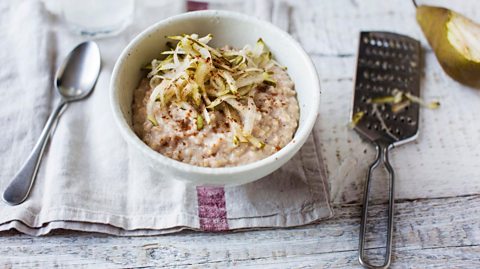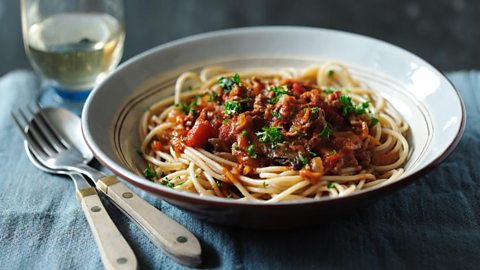Why porridge should be our go-to breakfast
It's not just healthier than sugary cereals, porridge (and other wholegrains) could also help to protect against health issues.
A long-term , which investigated the causes of cardiovascular disease, linked eating wholegrains like porridge oats to a reduced risk of heart disease, obesity and Type 2 diabetes.
Eating three servings of wholegrains a day was also found to be linked to smaller increases in waist size and lower blood pressure and blood-sugar levels among adults in middle-age or older by the researchers at .
Wholegrains may help manage weight
The study was conducted over 25 years, and participants were tested every four years. The waist size of the participants who ate the fewest wholegrains increased by an average of 3cm over each four-year period, compared with 1.4cm for those who ate the most wholegrains. A separate of 15 studies has linked eating three servings of wholegrains every day to lower body mass index (BMI) and less belly fat.
One reason for the difference may be that wholegrains contain fibre, which keeps you fuller for longer. βThe presence of dietary fibre in wholegrains can have a satiating effect,β says Caleigh Sawicki, who was involved with the Tufts University study. suggests a type of fibre called beta-glucan, found in oats, may increase fullness by delaying the time it takes your stomach to empty of food.
More than of adults in the UK donβt eat enough fibre, according to the National Diet and Nutrition Survey (NDNS). The recommended fibre intake is per day.
Healthy oat recipes
Wholegrains may protect against heart disease

Participants who ate more wholegrains were found to have greater protection against heart disease in the Tufts research. According to the , the risk of heart disease, stroke and Type 2 diabetes may be up to 30 percent lower in people who regularly eat wholegrains βas part of a low-fat diet and healthy lifestyleβ.
This could be partly because of the nutritional content of wholegrains, with their fibre-rich outer layer as well as their inner germ packed with B vitamins, antioxidants, minerals, small amounts of healthy fats, and other nutrients. βThe magnesium, potassium, and antioxidants may contribute to lowering blood pressure,β says Sawicki. The says, βaround a third of adults in the UK have high blood pressure, although many will not realise itβ.
βOur findings suggest that eating wholegrain foods as part of a healthy diet delivers health benefits beyond just helping us lose or maintain weight as we age,β says Nicola McKeown, senior author and scientist for the Tufts study.
Oaty snack recipes
What are wholegrains?
During the milling process, the nutrient and fibre-dense outer-layer (bran) and inner germ is removed from grains, and so it is not found in refined grains. βMost of the goodness in grains is in the outer bran layer and germ of the seed, so wholegrains can contain up to 75 percent more nutrients than refined cereals,β says the BDA.
Swapping refined grains for wholegrains
βMost of us eat too few wholegrains to get the health benefits from the range of nutrients they contain, as we tend to eat more refined cereals,β says the . The Tufts research links a diet high in refined grains, such as white pasta and bread, to greater increases in waist size. It concludes that replacing refined grains with wholegrains in your diet may be an effective way to reduce the liklihood of weight gain and the risk of cardiometabolic diseases.
The greatest contributor to the participantsβ wholegrain intake was wholegrain wheat bread and breakfast cereals. But wholegrain doesnβt always equal healthy, so check the label for other ingredients, such as salt and sugar. Eating porridge or overnight oats for breakfast is a simple, quick and delicious way to pack in benefits of wholegrain foods at the start of the day.
You can also incorporate wholegrains into your diet by swapping refined grains, such as white pasta, rice and bread, for their wholegrain counterparts. Even popcorn is a wholegrain, but itβs usually healthier to make it yourself. Experiment with less popular wholegrains too, such as barley, quinoa and rye.
Wholegrains and food intolerances
Wheat, barley, and rye contain gluten, a type of protein some people are intolerant or allergic to. Gluten-free wholegrains include buckwheat, rice, gluten-free oats and amaranth, but always look for 'gluten-free' on the label, as contamination can take place in the manufacturing. A number of grains, such as wheat and rye, are high in short-chain carbohydrates called FODMAPs, which can cause symptoms in people with irritable bowel syndrome (IBS).
This article was first published on 1st October 2021.


